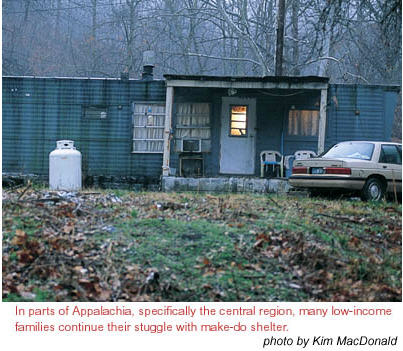Is poverty the cause of low broadband penetration?

In his DSL Prime newsletter, Dave Burstein takes a view that FCC Chair Kevin Martin's focus on improving broadband penetration by focusing on rural areas is not necessarily the quickest way to get there.
"There are not enough unservable rural homes to be the major explanation," Dave wisely writes. "Martin’s focus on low rural penetration pointed me to another characteristic of U.S. rural areas: poverty. Plenty of data to confirm that well off people almost all have broadband, the middle class is getting to a good take rate, and most of the homes that aren’t connected are folks who can’t afford it."
Places like Central Appalachia, shown in this photo from the Habitat for Humanity website.
To prove his point, Dave writes that in his view, a country with more poor people would have more homes without broadband than a more egalitarian nations of similar ’average” income. Then, Dave consulted the CIA World Factbook for some sample Gini coefficients. I'm not going to go all math geek on you, but these are mathematical formulas that, when applied to trends in various nations, rise when income is less equal throughout that country.
Dave found the following "Ginis":
Denmark
23 Sweden 25 Finland 26 France 27 Germany 28 Netherlands 31 Spain 33 Canada 33 Korea 35 Italy 36 UK 37 Japan 38 US 45
"Among the most equal, Denmark, Sweden and Finland have among the highest broadband rates, despite only moderate completion," Dave correctly points out. "At the bottom, the U.S. problem is well known, and the Japanese take rate is little higher than the U.S. despite (lower) prices.
Dave closes by writing that he'd love to see a comprehensive analysis of broadband data when contrasted against income inequality.
"Maybe someone at a Bell can demonstrate the U.S. problem is not of their doing, and if the U.S. wants broadband for all we should renew the war on poverty."
Hmm, a thought for a Monday.
